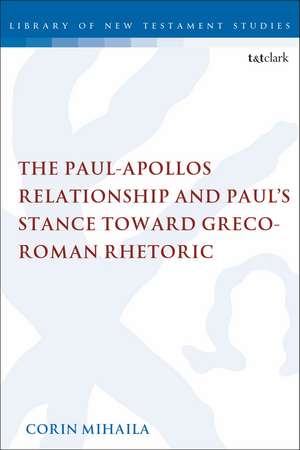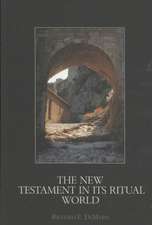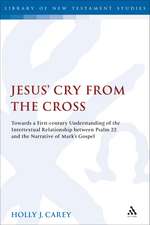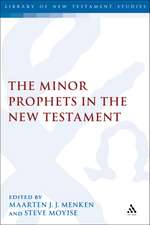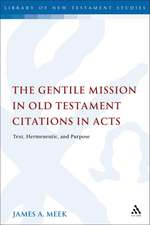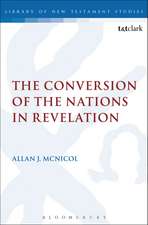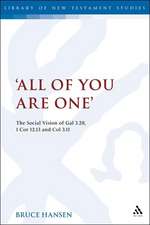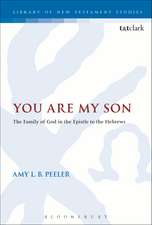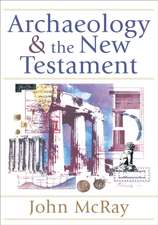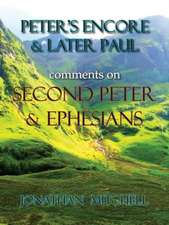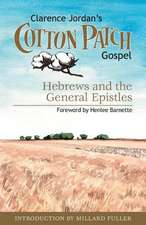The Paul-Apollos Relationship and Paul's Stance toward Greco-Roman Rhetoric: An Exegetical and Socio-historical Study of 1 Corinthians 1-4: The Library of New Testament Studies
Autor Corin Mihailaen Limba Engleză Paperback – 24 iul 2019
Research into the social and rhetorical background of the Corinthian church, shows that the Corinthians were evaluating their leaders based on their rhetorical prowess, seeking to associate with those who would enhance their status and honour. The coherence of Paul's argument in 1 Corinthians 1-4 is evaluated, particularly by showing how Paul's discourse of the cross and Sophia relate to the issue of the dissensions in the Corinthian ekklesia. Once demonstrated that there is a misunderstanding of wisdom amongst church leaders at the basis of the dissensions, a redefinition of the wisdom offered in Corinthians is required.
In what could be considered the locus of Paul's theology of proclamation (i.e., 1 Corinthians 2:1-5), he rejects any employment of worldly wisdom in his proclamation of the cross for theological reasons and will not allow himself or other leaders to be drawn into this game of personality cult and honour enhancement.
Such conclusions then raise the question of the role played by Apollos' name in Paul's argument against dissensions. After a review of several possible views, it is concluded-based primarily on exegetical grounds and refusing to engage in hermeneutical speculations-that Paul had a congenial relationship with Apollos. If any distinction is drawn between the two, it was solely the Corinthians' fault, who viewed their preachers in competitive rather than complementary terms.
| Toate formatele și edițiile | Preț | Express |
|---|---|---|
| Paperback (1) | 231.63 lei 6-8 săpt. | |
| Bloomsbury Publishing – 24 iul 2019 | 231.63 lei 6-8 săpt. | |
| Hardback (1) | 1008.27 lei 6-8 săpt. | |
| Bloomsbury Publishing – 24 iun 2009 | 1008.27 lei 6-8 săpt. |
Din seria The Library of New Testament Studies
- 34%
 Preț: 509.52 lei
Preț: 509.52 lei - 22%
 Preț: 832.58 lei
Preț: 832.58 lei - 22%
 Preț: 832.09 lei
Preț: 832.09 lei - 24%
 Preț: 190.33 lei
Preț: 190.33 lei - 22%
 Preț: 832.65 lei
Preț: 832.65 lei - 23%
 Preț: 191.31 lei
Preț: 191.31 lei -
 Preț: 221.70 lei
Preț: 221.70 lei -
 Preț: 98.92 lei
Preț: 98.92 lei - 31%
 Preț: 830.87 lei
Preț: 830.87 lei - 22%
 Preț: 834.60 lei
Preț: 834.60 lei - 22%
 Preț: 831.59 lei
Preț: 831.59 lei - 30%
 Preț: 717.05 lei
Preț: 717.05 lei - 22%
 Preț: 835.03 lei
Preț: 835.03 lei - 30%
 Preț: 511.40 lei
Preț: 511.40 lei - 24%
 Preț: 190.33 lei
Preț: 190.33 lei -
 Preț: 158.77 lei
Preț: 158.77 lei - 30%
 Preț: 510.04 lei
Preț: 510.04 lei - 22%
 Preț: 832.99 lei
Preț: 832.99 lei - 30%
 Preț: 509.52 lei
Preț: 509.52 lei - 22%
 Preț: 832.80 lei
Preț: 832.80 lei - 22%
 Preț: 831.76 lei
Preț: 831.76 lei - 22%
 Preț: 834.93 lei
Preț: 834.93 lei - 22%
 Preț: 831.59 lei
Preț: 831.59 lei - 22%
 Preț: 832.41 lei
Preț: 832.41 lei - 22%
 Preț: 832.99 lei
Preț: 832.99 lei -
 Preț: 414.71 lei
Preț: 414.71 lei - 30%
 Preț: 773.65 lei
Preț: 773.65 lei - 22%
 Preț: 834.93 lei
Preț: 834.93 lei - 14%
 Preț: 511.81 lei
Preț: 511.81 lei -
 Preț: 222.16 lei
Preț: 222.16 lei - 30%
 Preț: 775.67 lei
Preț: 775.67 lei - 30%
 Preț: 1012.49 lei
Preț: 1012.49 lei - 30%
 Preț: 509.02 lei
Preț: 509.02 lei - 30%
 Preț: 656.90 lei
Preț: 656.90 lei -
 Preț: 469.92 lei
Preț: 469.92 lei -
 Preț: 471.68 lei
Preț: 471.68 lei -
 Preț: 173.21 lei
Preț: 173.21 lei - 30%
 Preț: 833.64 lei
Preț: 833.64 lei - 22%
 Preț: 834.93 lei
Preț: 834.93 lei - 31%
 Preț: 772.17 lei
Preț: 772.17 lei - 30%
 Preț: 774.20 lei
Preț: 774.20 lei - 14%
 Preț: 1124.92 lei
Preț: 1124.92 lei - 22%
 Preț: 948.51 lei
Preț: 948.51 lei - 14%
 Preț: 1128.84 lei
Preț: 1128.84 lei - 31%
 Preț: 1065.91 lei
Preț: 1065.91 lei - 22%
 Preț: 777.71 lei
Preț: 777.71 lei - 31%
 Preț: 1064.84 lei
Preț: 1064.84 lei - 22%
 Preț: 1063.44 lei
Preț: 1063.44 lei - 22%
 Preț: 889.49 lei
Preț: 889.49 lei - 22%
 Preț: 1006.06 lei
Preț: 1006.06 lei
Preț: 231.63 lei
Preț vechi: 265.49 lei
-13% Nou
Puncte Express: 347
Preț estimativ în valută:
44.32€ • 47.40$ • 36.96£
44.32€ • 47.40$ • 36.96£
Carte tipărită la comandă
Livrare economică 17 aprilie-01 mai
Preluare comenzi: 021 569.72.76
Specificații
ISBN-13: 9780567689702
ISBN-10: 0567689700
Pagini: 272
Dimensiuni: 156 x 234 x 17 mm
Greutate: 0.39 kg
Editura: Bloomsbury Publishing
Colecția T&T Clark
Seria The Library of New Testament Studies
Locul publicării:London, United Kingdom
ISBN-10: 0567689700
Pagini: 272
Dimensiuni: 156 x 234 x 17 mm
Greutate: 0.39 kg
Editura: Bloomsbury Publishing
Colecția T&T Clark
Seria The Library of New Testament Studies
Locul publicării:London, United Kingdom
Caracteristici
Concise exposition of doctrinal guides to government and behaviour in the context of Paul's contemporaries.
Cuprins
Introduction
Chapter 1: The Literary and Thematic Unity of 1 Corinthians 1-4
Chapter 2: The Social and Rhetorical Background of 1 Corinthians 1-4
Chapter 3: Paul and Sophistic Rhetoric in 1 Corinthians 1-4
Chapter 5: Apollos' Function in 1 Corinthians 1-4
Summary and Conclusion
Bibliography
Recenzii
'Specialists will find this book to be a valuable resource on the Corinthian correspondence.'
"This exegetical and socio-historical investigation of 1 Corinthians 1-4 seeks to determine the relationship between Paul and Apollos in the light of Paul's stance toward Greco-Roman rhetoric. After a seven-page introduction, it shows the literary and thematic unity of 1 Corinthians 1-4, considers the kind of wisdom that the Corinthians appreciated, treats Paul's stance toward rhetorical eloquence, and raises the question of Apollos' function in the argument. Mihaila contends that when one takes Paul's argument and mention of Apollos at face value, it appears that Apollos and Paul shared a harmonious relationship in ministry, though Apollos was most likely an independent missionary. Thus the entire fault in the dissension lay with the Conrinthian Christians. -New Testament Abstracts, Vol. 54
'The social background is usefully discussed and worth pondering regardless of how friendly Paul may or may not have been with Apollos. After a very short introduction theliterary and thematic unity of these four chapters is established in a long opening chapter, their social and rhetorical background in a second. Chapter 3 discusses Paul and sophistic rhetoric, as refected in these chapters and chapter 4 Apollos 'function' in these four chapters. The breif summary and conclusions include 'homiletical implications'. The close attention to a very important part of the Pauline corpus makes this a monograph which many students of the New Testament could read with profit.' Robert Morgan, Linacre College, Oxford
"This exegetical and socio-historical investigation of 1 Corinthians 1-4 seeks to determine the relationship between Paul and Apollos in the light of Paul's stance toward Greco-Roman rhetoric. After a seven-page introduction, it shows the literary and thematic unity of 1 Corinthians 1-4, considers the kind of wisdom that the Corinthians appreciated, treats Paul's stance toward rhetorical eloquence, and raises the question of Apollos' function in the argument. Mihaila contends that when one takes Paul's argument and mention of Apollos at face value, it appears that Apollos and Paul shared a harmonious relationship in ministry, though Apollos was most likely an independent missionary. Thus the entire fault in the dissension lay with the Conrinthian Christians. -New Testament Abstracts, Vol. 54
'The social background is usefully discussed and worth pondering regardless of how friendly Paul may or may not have been with Apollos. After a very short introduction theliterary and thematic unity of these four chapters is established in a long opening chapter, their social and rhetorical background in a second. Chapter 3 discusses Paul and sophistic rhetoric, as refected in these chapters and chapter 4 Apollos 'function' in these four chapters. The breif summary and conclusions include 'homiletical implications'. The close attention to a very important part of the Pauline corpus makes this a monograph which many students of the New Testament could read with profit.' Robert Morgan, Linacre College, Oxford
